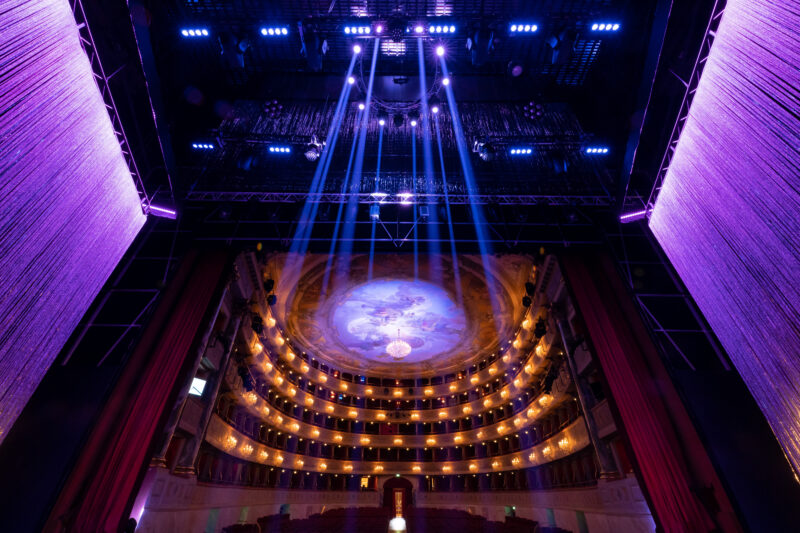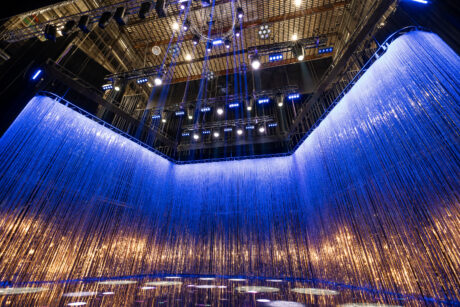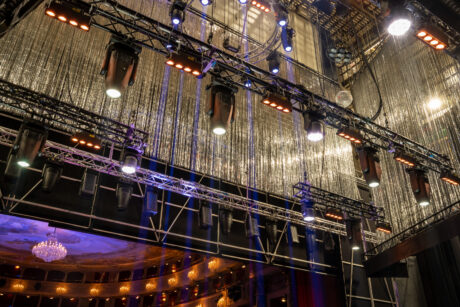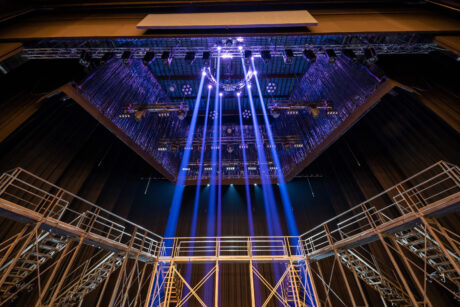 Raffa in the Sky is a tribute opera to the iconic figure of Raffaella Carrà, a prominent Italian TV personality also renowned internationally. It is the story of an artistic career that not only evolved with the changes in Italian society over the last half a century but occasionally inspired them. Through Carrà’s extraordinary experience, the work also aims to reflect on the artist’s role in society, the value and use of art, and the role of television and other media, not forgetting the songs she performed. The narrative transcends into the surreal and paradoxical to strike a chord with us all.
Raffa in the Sky is a tribute opera to the iconic figure of Raffaella Carrà, a prominent Italian TV personality also renowned internationally. It is the story of an artistic career that not only evolved with the changes in Italian society over the last half a century but occasionally inspired them. Through Carrà’s extraordinary experience, the work also aims to reflect on the artist’s role in society, the value and use of art, and the role of television and other media, not forgetting the songs she performed. The narrative transcends into the surreal and paradoxical to strike a chord with us all.
Show lighting designer Alessandro Anderoli told us: “As soon as I was appointed as LD for Raffa in the Sky, I started thinking about the kind of light and therefore which units to use for this rig. There are two main reasons why I preferred Claypaky. First, because of the quality. Through my experience of working on four operas directed by Francesco Micheli, I’ve come to understand his need for frequent shifts in lighting to vary lighting conditions and create different directorial strata. His productions are highly dynamic. Right from the first scenic sketches, it was clear that the two to three main alternating stage scenes would require different approaches. Hence, the decision to use Claypaky lights which allowed me to exploit nearly all the features of each fixture to their full extent.
Second, my choice was influenced by emotional and practical reasons: I have known Claypaky for over twenty years and used their lights for various events like theatre productions, summer shows and ceremonies. I have always found the right light in their catalogue, along with utmost reliability. The Fondazione del Teatro Donizetti has been working with Claypaky for over a year, and there was a mutual desire for a Bergamo-based partnership. Moreover, the Claypaky technical team have always solved our problems promptly when needed. This is an absolute linchpin for me.
Alessandro Andreoli then elaborated on the role of the Claypaky Sinfonya Profile during the show: “Its unique value in this opera lies in its main feature, the ability to vary the colour temperature of the LED engine, along with the light’s extraordinary technical performance across all parameters. From the beginning, it was clear that the Italian national broadcasting company (RAI) was going to film the opera, and the Sinfonya Profiles enabled me to confidently program the fixtures during rehearsals, knowing that I could later optimize the effects without drastically altering them once we were joined by the technicians for the shoot. They had specific colour temperature requirements for balanced in-camera images.

In addition to the Sinfonya Profiles, the lighting rig also included 10 Claypaky Xtylos units, 6 Claypaky Sharpy-X-Frames, 16 Tambora Flash fixtures, 4 B-EYE K25s and 12 Midi-B WWs. Referring to the Xtylos units, Andreoli told us that “the director was looking for a lighting effect that could both emulate a ‘heavenly ray’ for Raffa’s entrance and simultaneously represent a ‘cage’ as the narrative unfolded. We tried various options including the use of fibre optics and LED strips on frameworks, but it was when we saw the Xtylos in action that we immediately realized we had the solution. It was the perfect fit for us with its powerful, concentrated beam, zoom capabilities and gobos.
Sharpy X Frames were used as backlighting on the backing singers’ podiums, and one was placed upfront to create a spotlight effect. “I placed five of them to backlight the backing singers because we needed a different light for when the podiums appeared, since they were on a different physical and directorial level. Discharge lights served this purpose well. The potential to shape them led to that part of the stage being illuminated in its own unique way. One final X Frame was tentatively used as a followspot and, as the rehearsals progressed, it turned out to be a brilliant choice.”
The use of the powerful, hybrid Tambora Flash units, which can operate simultaneously as strobe lights, washlights and blinders, was very distinctive. Andreoli continued: ‘These lights were a real gamble. I was looking for a fixture that physically resembled a 1960s/70s/80s TV studio ceiling light, which was what set designer Edoardo Sanchi envisioned for the stage space. Obviously, I needed a fixture that also had colour changing capabilities to adjust the tone of the fixed units and that provided enough light to support the scenes. We slightly angled the Tambora Flash beams for backlighting so that the four lamps were clearly visible, which turned out to be the right choice. I spoke of a gamble because this unit was designed as a blinder, as its name implies. However, I wanted to use it in a non-conventional way, and I must say it surprised me. The two strips of strobe lights left us awe-struck by the amount of light they produced.”
The Midi-Bs were used as space-filling washlights. Eight were mounted on the battens on stage, two in the auditorium to support the front-lighting, and the last two as sidelights in front of the curtain, one on each side. The latter are essential in supporting all proscenium scenes with the frame folded down due to the compact size of the light itself.
Lastly, there is an interesting story behind the use of the four K25 B-Eyes. During rehearsals, it was decided to perform the second scene of Act II in the stalls with all the soloists wandering around the audience. Andreoli revealed that ‘having already installed all the available units on the battens and brackets, there was a clear need for something extra and special. Claypaky came to our rescue by providing us with these additional lights which, thanks to their power and zoom range combined with their capability to project videos on the curtain, created a magical, cinematic spectacle. The K25 was the right light for the purpose.”

Andreoli concluded: “I would like to thank the entire Claypaky team, and especially Alberico, Daniele, Giulia and Sandro for the support I have received from the very beginning of the project, which goes back several months before the staging.”
Massimo Boffelli, General Director of the Fondazione del Teatro Donizetti, emphasized that “the Fondazione del Teatro Donizetti is very proud to work with Claypaky. Our partnership brings together two internationally acclaimed Bergamo-based organizations and allows directors and lighting designers to express their creative ideas fully, even in the case of unique and experimental projects like ‘Raffa in the Sky’. We are confident that our alliance will continue in the coming years, touching new aspects of the Fondazione del Teatro Donizetti’s programme and events.”
Claypaky Sales Director Alberico D’Amato said: “We are proud to provide our most advanced technology to the Teatro Donizetti, which has always been an institution for the people of Bergamo and a global benchmark in the theatre world. Our company has provided top-ranking lighting products for a large number of entertainment sectors worldwide for nearly fifty years but has always had strong roots in the Bergamo area with which it shares the proverbial industriousness and attention to quality craftsmanship. We would like to thank the General Director of the Teatro Donizetti, Massimo Boffelli, the President of the Fondazione, Giorgio Berta, and the head of stage set design, Sergio De Giorgi for making the partnership between our two renowned Bergamo-based organizations possible”.
Learn more at www.claypaky.com



